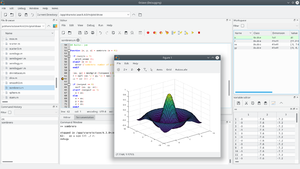Category:Resources: Difference between revisions
Jump to navigation
Jump to search
(Add photo of GUI.) |
m (Cookbook to Category:Examples.) |
||
| Line 6: | Line 6: | ||
* [[Octave Basics]] - A short reference card to get started. | * [[Octave Basics]] - A short reference card to get started. | ||
* [[Tips and tricks]] - Guidelines to improve your coding skills. | * [[Tips and tricks]] - Guidelines to improve your coding skills. | ||
=== Examples === | === Examples === | ||
* [[Cookbook]] - Several simple and useful examples. | |||
* [[Octave load]] - Use liboctave functions to load variables from a file in Octave's binary format. | * [[Octave load]] - Use liboctave functions to load variables from a file in Octave's binary format. | ||
* [[Fortran]] - Accessing liboctave from a Fortran 2003 program. | * [[Fortran]] - Accessing liboctave from a Fortran 2003 program. | ||
Revision as of 22:52, 13 June 2019
Tutorials
- Using Octave - A short introduction.
- Octave Basics - A short reference card to get started.
- Tips and tricks - Guidelines to improve your coding skills.
Examples
- Cookbook - Several simple and useful examples.
- Octave load - Use liboctave functions to load variables from a file in Octave's binary format.
- Fortran - Accessing liboctave from a Fortran 2003 program.
- Octave fun - Coding can be fun -- miscellaneous more or less funny scripts
- How to Connect SystemVerilog with Octave
Subcategories
This category has the following 3 subcategories, out of 3 total.
